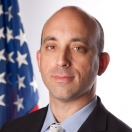
President Obama’s Administration is dedicated to elevating and scaling the most promising innovations that can tackle the toughest challenges. We know that the most effective models for creating lasting change can be found not in Washington DC, but in communities across the country where entrepreneurs and innovators try new approaches, then evaluate and improve them based on outcomes.
The President understands that if we hope to create an economy built to last, we need to invest in what works and spread best practices wherever we can find them. For this reason, he signed into law the bipartisan Edward M. Kennedy Serve America Act in April 2009. After its completion, the President directed the Corporation for National and Community Service (CNCS) to launch a cornerstone initiative of the new law, the Social Innovation Fund (SIF).
The SIF is elevating proven community solutions, helping build scale through philanthropic leverage and evaluation of results to fund programs that work. The first two funding rounds of the SIF leveraged a $95 million federal investment to catalyze additional private and nonfederal funding commitments totaling $250 million. This investment impacts communities across the country through 16 philanthropic intermediaries and nearly 200 remarkable nonprofit organizations.
For example, the SIF grant-making intermediary Venture Philanthropy Partners is reaching thousands of disconnected teens in the lowest income neighborhoods of Washington, DC, with strategies that are resulting in success in high school, college admission, and success in college. Another SIF intermediary, AIDS United, is using mobile engagement teams and telemedicine technology to reach the most chronically ill with specialized interventions that improve quality of life.
Today, the White House is happy to report that four new intermediaries have been awarded funding in the third round of the Social Innovation Fund.
The four new grantees are listed below:
- GreenLight Fund will work to close the achievement and opportunity gaps for more youth in Boston, Philadelphia, and the San Francisco Bay Area.
- Twin Cities Strive in partnership with the Greater Twin Cities United Waywill grow youth development programs for children in kindergarten through college in the Minneapolis-St. Paul area.
- John A. Hartford Foundation will expand an evidence-based program for treating depression into rural communities in Washington, Wyoming, Alaska, Montana, and Idaho.
- Capital Area United Way will address early childhood development, reaching young people in the Greater Baton Rouge Area.
These organizations were selected through a rigorous competition from a pool of 31 applicants. Each of the four awardees will receive $2 million over two years that will enable them to scale community-based solutions with strong evidence that their programs work.
I congratulate these four organizations on their awards. Their work to support communities is already making a significant difference. I look forward to seeing them expand their impact by growing dynamic nonprofits in the years ahead.
Jonathan Greenblatt is the Director of the White House Office of Social Innovation and Civic Participation.


